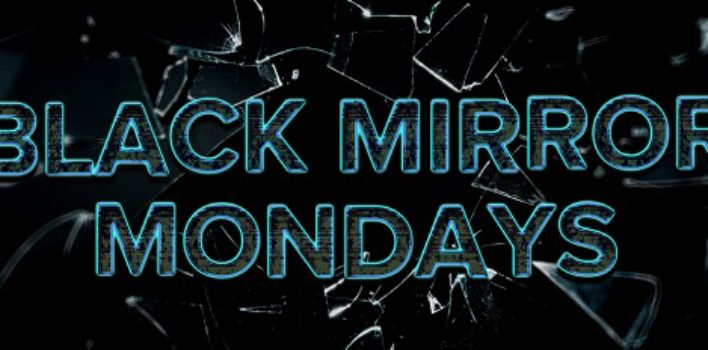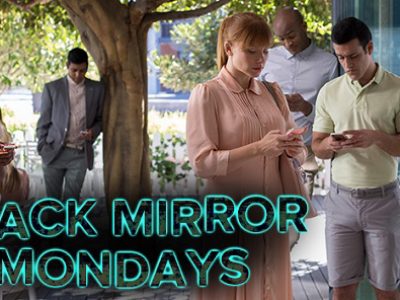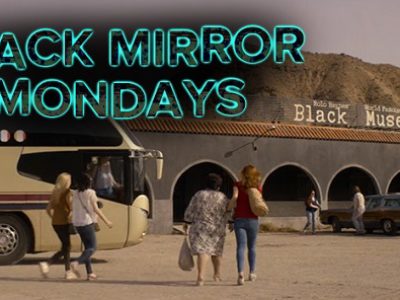Coming Soon| Black Mirror Mondays
Beginning Monday, January 15, Reel World Contributor Scott Kelly will begin “Black Mirror Monday”. Beginning with season 4 and revisiting the prior seasons, Scott will break down each episode from a Christian perspective and provide some meaningful, spiritual analysis…
One of my favorite C.S. Lewis quotes is one found in his collection of essays titled God in the Dock:
“I didn’t go to religion to make me happy. I always knew a bottle of Port would do that. If you want a religion to make you feel really comfortable, I certainly don’t recommend Christianity.”
It’s a quote I regularly end up adapting in some form or another in conversations with believers and non-believers alike, because it’s one of the most honest comments I’ve read about the Christianity from a Christian. In a world where comfort seems to precede truth at every turn, Christianity curiously falls out of favor with the common populace. A whole book can be written on that topic alone, but I’ll save further commentary on that idea for another time.
 I love recommending thoughtful yet unpopular films and TV shows to people – especially to Christians – and I’ve found that this Lewisian quote is very easy to adapt for one of my favorite shows, Black Mirror. For those that are unfamiliar with the show, Black Mirror is a British TV series that began airing in 2011 on Channel 4, but was purchased after its two initial seasons by Netflix. Taking cues and inspiration from classic shows like The Twilight Zone, Black Mirror is an anthology series that utilizes its structure to cover a broad band of topics in order to do its job, which is described on its Twitter page as “explain what’s happening to you as best we can.”
I love recommending thoughtful yet unpopular films and TV shows to people – especially to Christians – and I’ve found that this Lewisian quote is very easy to adapt for one of my favorite shows, Black Mirror. For those that are unfamiliar with the show, Black Mirror is a British TV series that began airing in 2011 on Channel 4, but was purchased after its two initial seasons by Netflix. Taking cues and inspiration from classic shows like The Twilight Zone, Black Mirror is an anthology series that utilizes its structure to cover a broad band of topics in order to do its job, which is described on its Twitter page as “explain what’s happening to you as best we can.”
Obviously there’s a lot happening with us, and as we know so well, the lot is happening because there are a lot of things wrong with us. Charlie Brooker and Annabel Jones, the program showrunners, embrace this fact to tell their unflinching and hard-hitting stories about the human condition. But the human condition and its brokenness is quite a broad spectrum; in every aspect of our lives, sin may abound. With that in mind, Brooker and Jones decided to hone in on what they believe is a primary outlet for the distribution of our sin – modern technology. The stories featured in Black Mirror, which tend to revolve around humanity’s technological dependence and how our sins manifest through it, are all cautionary tales, showing us “the way we live now – and the way we might be living in 10 minutes’ time if we’re clumsy.”
As one can imagine, this makes for a fairly unsettling show. To say that the show is for mature audiences only just scratches the surface. While not half as explicit in the usual sense as most premium cable or streaming television (in regards to sexual content, nudity, and violence), the potential turnoff for general audiences is that most of the stories in Black Mirror do not have happy endings – the textbook case for cautionary tales. However, an argument can be made for the strength of these endings. Do we tend to remember stories that end well for the protagonists or end poorly? I’m of the opinion that we remember the ones that end poorly. Just look at the many stories found in classic folklore and fable works for proof of this. Proof can be found in the film spectrum as well. For example, most folks claim that the best and most memorable Star Wars movie is The Empire Strikes Back, which ends poorly for our main protagonists and leaves them wounded, grieving, and with an uncertain future as the screen cuts to credits. Heck, the scene people quote the most from the entire series is the darkest revelation the main protagonist (Luke Skywalker) receives!
 From a personal perspective, I had a similar reaction to Frank Darabont’s The Mist, which was adapted from a Stephen King novella. When I first saw it almost a decade ago, I disliked – no, despised – the ending. I hated what happened to the main characters at the climax (no spoilers here, don’t worry!), and the story left such an impact on me in a negative sense that I refused to revisit it until a year or so ago. On my rewatch, the ending hit me just as hard, but I finally understood why the story impacted me so much. The Mist ends up being a cautionary tale about the loss of faith, and stresses the importance of holding on to hope through your current trials no matter what the situation looks like.
From a personal perspective, I had a similar reaction to Frank Darabont’s The Mist, which was adapted from a Stephen King novella. When I first saw it almost a decade ago, I disliked – no, despised – the ending. I hated what happened to the main characters at the climax (no spoilers here, don’t worry!), and the story left such an impact on me in a negative sense that I refused to revisit it until a year or so ago. On my rewatch, the ending hit me just as hard, but I finally understood why the story impacted me so much. The Mist ends up being a cautionary tale about the loss of faith, and stresses the importance of holding on to hope through your current trials no matter what the situation looks like.
I’ve come to the conclusion that most people – myself included – will always have a knee-jerk reaction to cautionary tales. But I’ve also found that most folks – myself included at one point – miss the reasons why cautionary tales have to end like they usually do in order to cement itself into your mind and onto your heart. When written well, cautionary tales hit us hard because we see ourselves in the characters. We see ourselves making the same decisions. We see ourselves going down the same dark paths. And we don’t like that. It hits a nerve. And most of all, it convicts us.
Scott Derrickson, popularly known as the director of Marvel’s Doctor Strange, is also known for his many horror films, including The Exorcism of Emily Rose and Sinister. As a professing Christian, Derrickson has interacted with many Christians about why he chooses to write and direct horror films – most of which do not have happy endings. In an interview, Derrickson stated the following:
“I think it’s important for anyone who takes cinema seriously not to limit yourself to just optimistic or happy movies. I think that’s a problem. You’ve got to be willing to let the art of cinema take you into some darker places if you’re going to make full use of it. There are some people who shouldn’t watch horror films, and I’m all right with that. It’s not about putting something evil in the world. It’s about reckoning with evil. We don’t need any more evil in the world. We need a lot more reckoning with it.”
 This is the driving force behind Brooker’s Black Mirror. By utilizing the art of film, Brooker has provided us with 19 stories to help us reckon with our own evils and the horrors that modern or futuristic technology may provide. Right before 2018 arrived, Season 4 of Black Mirror landed on Netflix, giving us 6 new episodes to ruminate upon. Each episode provides a wealth of conversation starters and new dragons for us to figure out how to defeat – should our protagonists can’t do it themselves. (Hint: they probably won’t.)
This is the driving force behind Brooker’s Black Mirror. By utilizing the art of film, Brooker has provided us with 19 stories to help us reckon with our own evils and the horrors that modern or futuristic technology may provide. Right before 2018 arrived, Season 4 of Black Mirror landed on Netflix, giving us 6 new episodes to ruminate upon. Each episode provides a wealth of conversation starters and new dragons for us to figure out how to defeat – should our protagonists can’t do it themselves. (Hint: they probably won’t.)
I don’t go to Black Mirror to make me happy. I will always know an episode of Stranger Things can do that. If you want a TV show to make you feel really comfortable, I certainly don’t recommend Black Mirror. However, should you choose to peer into the darkened glass and follow me on a journey through the series, every Monday at Reel World Theology we will examine and explain a different Black Mirror episode, starting with Season 4 (“U.S.S. Callister”) and moving backwards chronologically to finish up at Season 1 (“The Entire History of You”). Again, this show is not for everyone as far as enjoyment levels and subjective convictions go, but everyone – especially Christians – should know what the show speaks on. Hope to see you on Monday!







